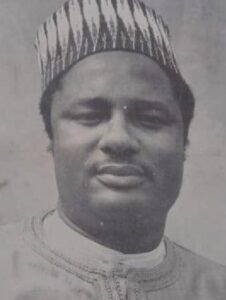Meet the First Nigerian Governor Who Resigned Before Decamping—and Why It Still Matters Today
Meet the First Nigerian Governor Who Resigned Before Decamping—and Why It Still Matters Today

Muhammadu Abubakar
In Nigerian politics today, it’s common to see politicians leave the party that brought them to power and join another—often without any consequences. But it wasn’t always like this.
Muhammadu Abubakar Rimi, the first civilian governor of the old Kano State, made history for doing what few politicians would dare. Elected under Aminu Kano’s PRP, Rimi later chose to switch to Nnamdi Azikiwe’s NPP. But before making the move, he resigned from office—believing it was wrong to keep a seat he won under a different party. It was a bold and principled act that showed respect for voters and party loyalty.
Today, things are quite different. The Nigerian Constitution doesn’t clearly say what should happen when elected leaders defect—especially governors and presidents. Because of that, many switch sides and keep their positions. This usually benefits the ruling party, while the opposition loses strength.
Although lawmakers in the National Assembly are discussing changes to the constitution, none of the current bills address this growing problem of party-switching. Without rules in place, political loyalty weakens, and voters may feel that their choices at the ballot box don’t really matter.
The story of Rimi reminds us that politics can be guided by principle. But without legal reform, party defections may continue to erode trust in Nigeria’s democracy.
TRENDING SONGS
 NNPC Boss Ojulari Bags UK Energy Institute Fellowship
NNPC Boss Ojulari Bags UK Energy Institute Fellowship
 Shock in Anambra: Bride Disappears Moments Before Wedding
Shock in Anambra: Bride Disappears Moments Before Wedding
 Nigerian Woman Returns ₦330 Million Accidentally Credited to Her Account
Nigerian Woman Returns ₦330 Million Accidentally Credited to Her Account
 APC Don Reach Morocco?’ VeryDarkMan Reacts to Seyi Tinubu Poster
APC Don Reach Morocco?’ VeryDarkMan Reacts to Seyi Tinubu Poster
 Bride Breaks Down in Tears as Wedding Meals Were Kept Secretly While Guests Go Home Hungry
Bride Breaks Down in Tears as Wedding Meals Were Kept Secretly While Guests Go Home Hungry
 Odogwu by Day, Robber by Night: How Marriage Joy Turned Into Tragedy
Odogwu by Day, Robber by Night: How Marriage Joy Turned Into Tragedy
 Nigerian Officials Allegedly Pocket N4–6B Weekly Through Smuggling Cartels at Seme–Badagry Border
Nigerian Officials Allegedly Pocket N4–6B Weekly Through Smuggling Cartels at Seme–Badagry Border
 Ahmad Yerima: Naval Officer to Face No Sanctions After Clash with Wike – Matawalle
Ahmad Yerima: Naval Officer to Face No Sanctions After Clash with Wike – Matawalle
 Trending Video: Muslim Man Joins Wife in Hallelujah Challenge ‘Dress Like Your Miracle’ Night
Trending Video: Muslim Man Joins Wife in Hallelujah Challenge ‘Dress Like Your Miracle’ Night
 Woman Seeks Advice as Late Brother’s Wife Refuses to Mourn Him Following His Death With Alleged Mistress
Woman Seeks Advice as Late Brother’s Wife Refuses to Mourn Him Following His Death With Alleged Mistress
Share this post with your friends on ![]()













